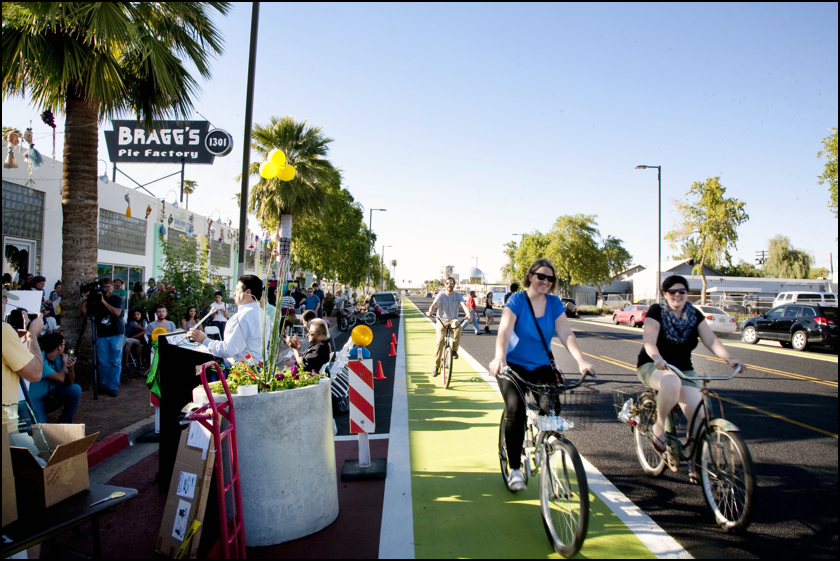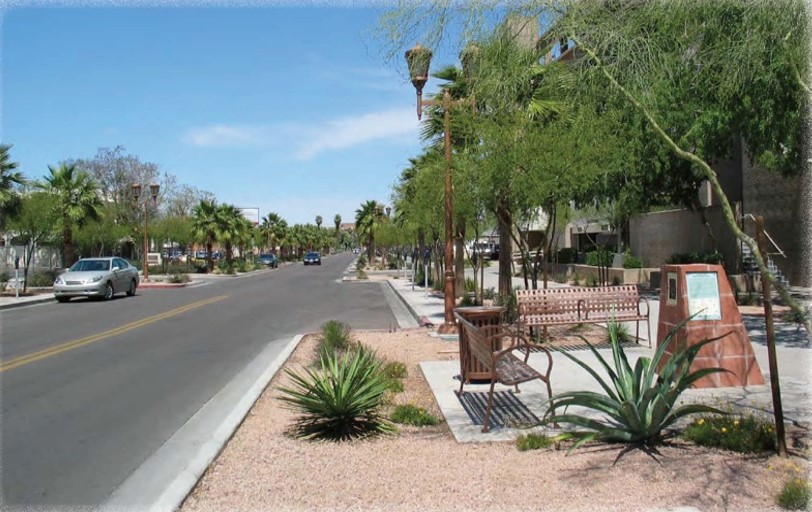The City's complete streets policy further advances its goal to create a more sustainable transportation system that is safe and accessible for everyone. Complete streets provide infrastructure that encourages active transportation such as walking, bicycling, transportation choices and increased connectivity. Through this policy, the primary focus of street design will no longer be solely on the speed and efficiency of automobile travel, but on the safety and comfort of all users of the public right-of-way (ROW).
Phoenicians have been slowly making the shift towards a more multi-modal way of living, meaning that more and more people are beginning to incorporate some level of active transportation into their lives via walking or bicycling in order to reap the benefits of a healthy lifestyle, connect with the community, and improve overall quality of life. This shift has not gone unnoticed by big business, and many corporations are placing significant weight on the livability of cities when looking to relocate or expand into new regions. In order for Phoenix to be successful in attracting and retaining the interests of large corporations, entrepreneurs, and local talent, it is imperative for Phoenix to invest in complete streets in order to improve livability and quality of life for all who live here. As the population of Phoenix continues to grow, it is important that all new and retrofitted streets be thoughtfully designed in a way that makes the best use of the public ROW. By evaluating current and future land uses and identifying specific needs associated with each project area it will be possible to make incremental changes that increase the safety and comfort of all streets for roadway users of all ages and abilities, regardless of their preferred mode of transportation.
The policy also supports major City initiatives such as the Transportation 2050 Program, Comprehensive Bicycle Master Plan, Downtown Phoenix Comprehensive Transportation Plan, General Plan, Choice Neighborhoods Grant, Reinvent PHX and other multi-modal planning and development activities. Elements of the Complete Streets policy where achieved through input received from staff and the complete streets advisory board that was formed with community and city stakeholders interested in active transportation and safe streets; and other stakeholders including both private development and health representatives.


Benefits of Complete Streets
Complete streets are context sensitive, so there is no one-size-fits-all approach to design. Flexibility enables projects to be tailored to the specific needs of each community with regards to their surrounding land uses and street character, allowing for the selection of facilities and amenities best suited to the needs of each community.
Complete streets are implemented incrementally through new developments and retrofit projects. They are a vital tool for filling gaps and making important connections needed to provide a contiguous transportation network for all travel modes.
Complete streets benefit economic growth and stability by creating safe and accessible connections between places of residence, offices, schools, parks, public transit, essential services, and retail destinations.
Complete streets benefit our children by creating safe routes to school. Enabling children to walk and ride bikes to school increases physical activity, provides independence, and helps to foster a sense of pride for the community.
Complete streets are good for the environment. Encouraging and facilitating the use of non-motorized modes of transportation, can help to reduce the number of trips made by car. Less cars on the road mean less air and noise pollution.
Complete streets can improve health and wellness. Creating an environment where pedestrians and bicyclists of all ages and abilities feel safe and comfortable, opportunities are created for replacing short automobile trips with non-motorized forms of transportation. Active transportation can help to reduce instances of obesity, diabetes, heart disease, as well as other conditions which may be affected by low levels of physical activity.
Complete streets encourage safe driving habits. Treatments such as "Road Diets" can help to reduce excessive speeds and vehicle interactions by narrowing travel lane widths and providing an appropriate number of through lanes based on actual vehicle capacity.
